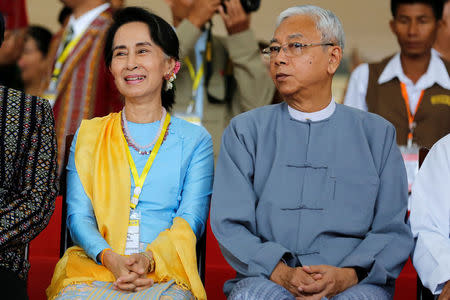Myanmar's Suu Kyi seeks to revive peace process with fresh talks
By Wa Lone YANGON (Reuters) - Myanmar's leader Aung San Suu Kyi opened a new round of talks with some of the country's myriad ethnic groups on Wednesday, looking to revive a stuttering peace process after a tough first year in power that saw the worst fighting with rebels in years. The conference comes amid continued tensions between ethnic armed groups, the military and Nobel Peace Prize winner Suu Kyi, and analysts said it was unlikely to see any new groups join a landmark ceasefire accord negotiated by the previous administration. Ending decades of near-perpetual civil war is Suu Kyi's stated No. 1 priority - a goal she sees as key to unlocking the resource-rich country's potential and guaranteeing basic development for its more than 50 million people. In an opening speech, Suu Kyi urged the gathered rebel representatives to join the National Ceasefire Agreement (NCA) negotiated by a quasi-civilian transitional government that took office after the end of junta-rule in 2011. She said the NCA was not a goal in itself, but a first step towards deepening dialogue. "We recognise that ceasefire negotiations can address surface problems, but only political dialogue can address underlying grievances," Suu Kyi told the delegates gathered in the capital Naypyitaw. The 71-year-old de facto leader of the country said that the "door to dialogue" with groups that have not yet signed the peace deal remained open, pledging she would strive to bring them "under the NCA umbrella". Some representatives of ethnic armed groups have complained in the past that Suu Kyi has taken a top-down approach to the process, unilaterally dictating the agenda, often ignoring their grievances and siding too closely with the military. While several groups that have recently clashed with government forces, and whose attendance had been in doubt, joined the negotiations, a handful of other important groups pulled out at the last minute, local media said. Among issues on the agenda are whether the states that make up Myanmar would be allowed to draft their own constitutions and the status of religion. CONFLICTS REKINDLED Chinese foreign ministry spokesman Lu Kang told reporters in Beijing that China supported all efforts to bring about peace and ethnic reconciliation in Myanmar and called for all sides to resolve their differences peacefully via talks. Several large rebel groups operate on the rugged Myanmar-China border and Beijing's special envoy, Sun Guoxiang, has quietly urged them to attend the conference, amid a warming of relations between the two countries. Myanmar army chief Senior General Min Aung Hlaing told the conference that signing up to the NCA did not amount to surrender by armed groups, and pledged the military would play its part in seeking solutions to end conflicts. But he also warned the groups against pushing for too much autonomy and going beyond the contours of the federal state. "Such acts go against the desires and interest of the people who have high expectations of the democracy cause and peace process," he said, adding that the military would "have to face any organization committing destructive acts in line with its responsibility". Several conflicts have reignite since Suu Kyi took power, displacing an estimated 160,000 people, according to data from the United Nations. A coalition of four rebel groups comprising one of Myanmar's most powerful militias, the Kachin Independence Army (KIA), staged attacks on security forces in the north of the country in November. In the spring, fighting with Kokang rebels in the hills along the Chinese border sent about 20,000 refugees fleeing to China's Yunnan province. The conflict in northwestern Rakhine state, where an army crackdown on Rohingya Muslim insurgents forced 75,000 people to flee to Bangladesh amid allegations of widespread atrocities, is separate from the peace process and will not be discussed at the five-day conference. (Additional reporting by Antoni Slodkowski in Yangon and Ben Blanchard in Beijing; Editing by Alex Richardson)

 Yahoo News
Yahoo News 


